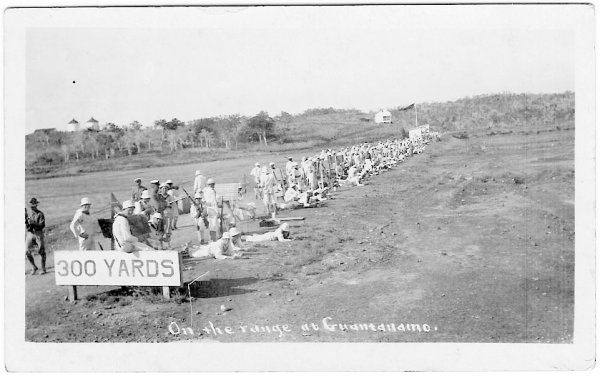
| Back to Table of Contents |  |
Back to Partisan Home |
| Previous Section | Next Section |

This old postcard shows U.S. Marines on the gunnery range at Guantánamo Bay about 1912, when U.S. troops suppressed a Cuban rebellion. |
The Peace and Freedom Party calls for the closure of the U.S. naval base at Guantánamo Bay, Cuba, and the return of the land to Cuba.
The U.S. occupies the base in violation of Cuba's sovereignty. U.S. abuse of prisoners at Guantánamo is now the subject of a lawsuit by the American Civil Liberties Union (ACLU) against former Defense Secretary Donald Rumsfeld.
In the last quarter of the 20th century, the base was used to house Cuban and Haitian refugees intercepted on the high seas. In the early 1990s, it held refugees who fled Haiti after military forces overthrew democratically elected President Jean-Bertrand Aristide. The last Haitians left Guantánamo in November 1995.
In 2002, part of the base was converted to imprison alleged al-Qaeda and Taliban members captured in Afghanistan and elsewhere. The Bush administration maintained that the prisoners had no rights, since they weren't on U.S. territory and weren't prisoners of war but "enemy combatants." The U.S. Supreme Court ruled that the detainees "have been imprisoned in territory over which the United States exercises exclusive jurisdiction and control," and therefore have the fundamental right to due process of law under the Fifth Amendment. A district court later held that the Geneva Conventions on prisoners of war applied to Taliban detainees, but not to members of al Qaeda.
On the 10th of June 2006, three Guantánamo Bay detainees committed suicide. The military reported the men hanged themselves with nooses made of sheets and clothes. One of the men was first detained when he was a juvenile. They each had been imprisoned for the past four years, but never charged with a crime. Before June 10th there had been 41 suicide attempts at the camp.
Amnesty International, the United Nations and the European Union have called for closing the Guantánamo Prison.
Using the explosion of the Battleship Maine as a pretext, the U.S. government in 1898 declared war on Spain and occupied Cuba to prevent the imminent defeat of Spanish troops by revolutionaries who threatened imperialist interests. Suppressing the popular forces politically and militarily, the U.S. imposed a Cuban constitution that included the Platt Amendment. This amendment ceded the Guantánamo Bay base to the U.S., subordinated Cuban finances and treaties to U.S. control, and gave the U.S. the right to intervene militarily whenever the U.S. found it necessary. (During this same period, U.S. troops occupying the Philippines, that had been Spain's other major colony, fought a brutal genocidal war that crushed the independence movement and made the Philippines a U.S. colony for almost half a century.)
Except for U.S. rights to Guantánamo Bay, the Platt Amendment provisions were repealed by a new treaty in 1934. The long-term lease of Guantánamo Bay continues, and according to the treaty can only be revoked by consent of both parties. The Cuban government strongly denounces the treaty on grounds that article 52 of the 1969 Vienna Convention on the Law of Treaties declares a treaty void if its conclusion has been procured by the threat or use of force. The original treaty was imposed under U.S. military occupation, and the 1934 treaty reaffirming the lease was signed after Franklin D. Roosevelt sent 29 U.S. warships to Cuba and Key West.
| Back to Table of Contents |  |
Back to Partisan Home |
| Previous Section | Next Section |